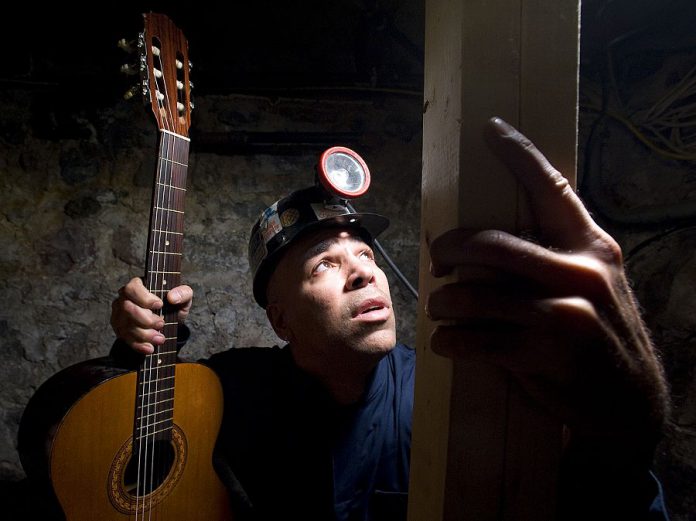
February is Black History Month, so what better time to celebrate the memory of an unsung African-Canadian hero?
Beneath Springhill: The Maurice Ruddick Story is a one-man play written and performed by Peterborough actor and musician Beau Dixon. He’ll be touring the play among schools in the Greater Toronto Area during Black History Month, but you’ll have a chance to see it at a one-night-only public performance on Saturday, February 7th at The Theatre on King in downtown Peterborough.
In January, Beau performed the play at Calgary’s Lunchbox Theatre, as part of the High Performance Rodeo International Festival of the Arts, where it received rave reviews.
The Calgary Sun wrote that the play “is genuinely uplifting and though it is undeniably heart-wrenching, it is far from depressing”. The Calgary Herald called it a “spellbinding solo show” with Beau as “a charismatic, lovable performer onstage”.
Many Canadians know about the Springhill mine disaster (there’s actually been more than one), but many may not know the story of African Canadian Maurice Ruddick — something Beau is trying to remedy by bringing his play to public school and high school students.
“I feel it’s important to tell Ruddick’s story, because it’s a touching one about the strength of a community, family, hope and courage, and racial equality,” he says.
Ruddick’s story begins on October 23, 1958, when 174 coal miners became trapped four kilometres underground in Springhill, Nova Scotia after a massive “bump” — an earthquake-like event often caused by the collapse of mine walls or supports. Of the 174 men who were trapped, 75 died and 99 were eventually rescued. It took rescuers nine days to extract the men, dead and alive, from deep below the ground. On the last day, they reached the final seven men who were still alive — among them the 46-year-old Ruddick.

While the survivors became minor celebrities after the disaster, Ruddick — the only African Canadian among them — suffered from the racism of the day. Georgia’s governor invited the survivors to vacation at a luxurious resort but, upon learning Ruddick was black, demanded that he and his family be segregated from the others. The other survivors were against it, but Ruddick agreed to the governor’s terms so that the miners and their families could go on the vacation.
Although Ruddick was voted Canada’s Citizen of the Year for 1958 by Toronto Telegram readers shortly after the disaster (the first African Canadian to receive such an honour), he downplayed his heroism. Over the years, his contribution to Canadian history was largely forgotten and he died in relative obscurity in 1988.
In Beneath Springhill: The Maurice Ruddick Story, Beau resurrects Ruddick’s story by playing nine different characters, including Ruddick, Ruddick’s 10-year-old daughter Valerie (who in real life later wrote the song “No More Pickin’ Coal” in memory of a childhood spent in poverty after the disaster), and the CBC announcer whose broadcast brought international attention to the story.

“This is actually a drama with music,” he explains. “There’s music in the play because Maurice was quite a good musician. The main ingredient of the story is music. That’s what really drew me to this historical figure; he kept six other miners alive by keeping their morale up with song and prayer. Music was a big part of Maurice’s life in the mine.”
For the past few years, Beau has been touring the play at schools every year during Black History Month. He says it’s an entertaining way to educate students about the poor working conditions in the mine and, more importantly, about the racial tension that was common in Canada in the 1950s. Ultimately, however, the play illustrates how race becomes irrelevant when everything else is stripped away.
“When it came down to saving lives and working together as a community, race wasn’t an issue,” Beau explains. “It was about survival and humanity. I think that’s an important lesson for kids today to be reminded of: our lives are very fragile. We should embrace the time we have on this planet and make the best of it, and that includes human decency.”
While his experience growing up in culturally diverse Canada has generally been positive, Beau has encountered racism himself. He’s been subjected to the occasional racial slur, although he says he’s been a witness to racism more than he’s been a victim — because of the colour of his skin. Like Ruddick, Beau is of mixed race: his mother is white and his father is black.
“Those that are ignorant and cruel are a bit tongue-tied when they try to think of words to insult me,” he says. “I sort of look like I have African roots, but I also look Cuban or Lebanese. They get confused.”
While Beau may have lighter skin than other African Canadians, his African heritage is important to him and has influenced his development as a musician and performer in many ways.
“The biggest one is that these stories found me,” he says. “I never would have imagined being a playwright, but these stories were calling me. It was as if I was called upon to discover my roots. And through this discovery, I’m able to perform to and educate an audience that’s itching to be provoked and entertained. I write historical fiction plays to tell stories about my African Canadian heritage and to educate those who are unaware of the racism that existed in Canada. It’s important that history does not repeat itself. We still need to remind ourselves of that important message.”
You can see Beau perform Beneath Springhill: The Maurice Ruddick Story on Saturday, February 7th at The Theatre on King in downtown Peterborough. Performances take place at 7:30 p.m. and 9 p.m. Tickets are $15.


























